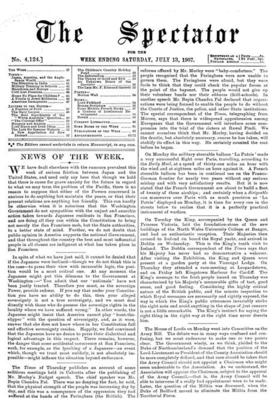In spite of what we have just said, it cannot
be denied that if the Japanese were inclined—though we do not think this is the case—to press their view with inexorable logic, the posi- tion would be a most critical one. At any moment the Japanese might put this dilemma to the Government at Washington :—" You admit that our nationals' have not been justly treated. Therefore you must, as the sovereign Power, provide redress. If you say that under your Constitu- tion you have no ability to do this, . then your alleged sovereignty is not a true sovereignty, and we must deal directly with those who do possess the sovereign rights in the locality where we have suffered wrong." In other words, the Japanese might insist that America cannot play " hunt-the- slipper" with the question of sovereignty, and, as it were, answer that she does not know where in her Constitution full and effective sovereignty resides. Happily, we feel convinced that the Japanese have no desire to press their dialectical and logical advantage in this respect. There remains, however, the danger that some accidental occurrence at San Francisco, such, for example, as the lynching of a Japanese—an event which, though we trust most unlikely, is not absolutely im- possible—might inflame the situation beyond endurance.






































